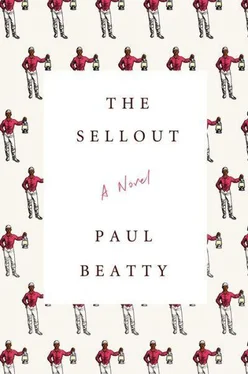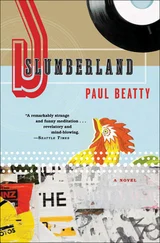I copped a seat near King Cuz, who was playing the back as usual, munching on a maple bar and leafing through a stray issue of Lowrider magazine. When Foy Cheshire spotted me, he tapped his Patek Philippe like I was a deacon walking in late to church. Something wasn’t right about Foy. He kept interrupting McJones with meaningless questions.
“So hurling, that’s also college slang for vomiting, am I right?”
Seeing as he wasn’t using it, I borrowed Cuz’s copy of The Ticker . In the fiscal quarter since the Wheaton Academy’s inception, employment in Dickens was up an eighth. Housing prices had risen three-eighths. Even graduation rates were up a quarter. Finally, black people were in the black. And though it was still early in the social experiment and the sample size was relatively small, the numbers didn’t lie. For the past three months, since the Wheaton Academy went up, the students at Chaff Middle School were performing considerably better. Not that anyone was going to be skipping any grades or putting in an appearance on Who Wants to Be a Millionaire anytime soon, but on average, the scores on the state proficiency exams were approaching, if not mastery, a promising competency. And as near as I could make out from the state guidelines, the improvement was such that, in all likelihood, the school would not be going into receivership, at least not anytime soon.
After the reading was over, Foy strode to the front of the room, clapping like an enthusiastic child at his first puppet show. “I’d like to thank Mr. McJones for that stimulating reading, but before we get into this afternoon’s subject matter, I have an announcement. The first is that my latest public-access show, Black Checker , has been canceled. The second is that, as many of you may know, a new battle has begun, and the enemy dreadnought is right here offshore in the form of the Wheaton Academy, which is an all-white school. Now, I have friends in high places, and they all deny the existence of the Wheaton Academy. But fret not, I have developed a secret weapon.” Foy dumped the contents of his attaché case onto the nearest table, a new book. Two people immediately got up and left. I wanted to join them, but remembered I was there for a reason, and part of me was insanely curious as to what American classic Foy would bastardize next. Before passing it around the room, Foy coyly showed the book to Jon McJones, who shot back a look that said, “Nigger, you sure you want to unleash this shit on the world?” When it reached the back, King Cuz handed it off to me without even looking at it, and as soon as I read the title, I didn’t want to let go. The Adventures of Tom Soarer. It dawned on me that Foy’s written works were Black Folk(s) Art and were going to be worth something one day. I was beginning to regret the book burning thing and that I hadn’t started a collection, because I’d spent the past ten years looking down my broad black nose at probably now-impossible-to-find first-and-only-edition titles like The Old Black Man and the Inflatable Winnie the Pooh Swimming Pool, Measured Expectations, Middlemarch Middle of April, I’ll Have Your Money — I Swear . On the cover of Tom Soarer , a preppy black boy, wearing penny loafers and argyle socks exposed by a pair of flooding whale-print lime-green pants, and armed with a bucket of whitewash, stood bravely in front of a wall splashed in gang graffiti, while a pack of ragamuffin hoodlums looked on menacingly.
When Foy snatched Tom Soarer from my hands, it felt like I’d fumbled away a game-winning touchdown catch. “This book, I’m not ashamed to say, is a WME, a Weapon of Mass Education!” Unable to contain his excitement, Foy’s voice rose two octaves and took on a Hitlerian fervor. “And just as he inspired me, the character of Tom Soarer will galvanize a nation to whitewash that fence! To cover up those frightful images of racial segregation that the Wheaton Academy represents. Who’s with me?” Foy pointed at the front door. “I know these great African-American heroes are down with the cause…” Legally, I’m not allowed to say who Foy name-dropped, because when I turned my head toward what I thought would be Foy’s invisible hallucinations, standing in the Dum Dum Donuts doorway were three of the world’s most famous living African-Americans, the noted TV family man _ i _ _ _ _ _ b _ and the Negro diplomats _ o _ _ _ _ o _ _ _ and _ _ n _ _ _ e e _ _ _ _ _ c _. Sensing the Dum Dum Donut Intellectuals were dying, Foy had pulled out all the stops and called in who knows what favors. Somewhat surprised the crowd was so small, the three superstars cautiously sat down and, to their credit, ordered coffee and bear claws and participated in the meeting, most of which was spent with Jon McJones regurgitating the usual Republican Party bullshit that a child born into slavery in 1860 was more likely to be raised in a two-parent household than was a baby born after the election of the U.S.A.’s first African-American president. McJones was a snobby Negro who covered up his self-hatred with libertarianism; I at least had the good sense to wear mine on my sleeve. He went on to cite statistics that, even if true, were completely meaningless when you consider the simple fact that slaves were slaves. That a two-parent antebellum household wasn’t necessarily a bond of love but a forced coupling. He didn’t mention that some two-parent slave marriages were between sister and brother, mother and son. Or that, during slavery, divorce wasn’t really an option. There was no “I’m going out for cigarettes” and never coming back. What about all the two-parent households that were childless because their kids had been sold off to who knows where? As a modern-day slave owner, I was insulted that the venerated institution of slavery was not given the viciousness and cruelty which it was due.
“What a load of crap,” I said, interrupting McJones with a schoolboy raise of the hand.
“Like you wouldn’t rather be born here than in Africa?” C _ _ _ n _ _ w _ _ _ snapped back with a streetwise inflection that belied his curriculum vitae and his V-neck sweater.
“What, here?” I pointed at the floor. “Like in Dickens?”
“Well, maybe not a hellhole like Dickens,” McJones said, giving the other guests a “Don’t even bother, I got this” glance. “Nobody wants to live here, but you can’t even pretend to tell me that you’d rather be born in Africa than anywhere else in America.”
You’d rather be here than in Africa. The trump card all narrow-minded nativists play. If you put a cupcake to my head, of course, I’d rather be here than any place in Africa, though I hear Johannesburg ain’t that bad and the surf on the Cape Verdean beaches is incredible. However, I’m not so selfish as to believe that my relative happiness, including, but not limited to, twenty-four-hour access to chili burgers, Blu-ray, and Aeron office chairs is worth generations of suffering. I seriously doubt that some slave ship ancestor, in those idle moments between being raped and beaten, was standing knee-deep in their own feces rationalizing that, in the end, the generations of murder, unbearable pain and suffering, mental anguish, and rampant disease will all be worth it because someday my great-great-great-great-grandson will have Wi-Fi, no matter how slow and intermittent the signal is.
I said nothing and let King Cuz do my fighting for me. In twenty years, I’d never heard him say anything in a meeting more substantive than acknowledging the fact that the iced tea could use more sugar, but there he was, facing off with a man with four advanced degrees who spoke ten languages, none of them black except French.
“Nigger, I refuse to let you impugn Dickens like that!” Cuz said sharply, standing up and pointing a freshly manicured nail at McJones. “This is a city, not a hellhole!”
Читать дальше












